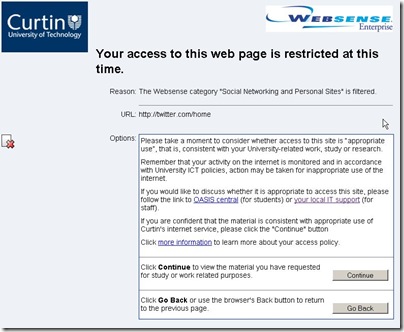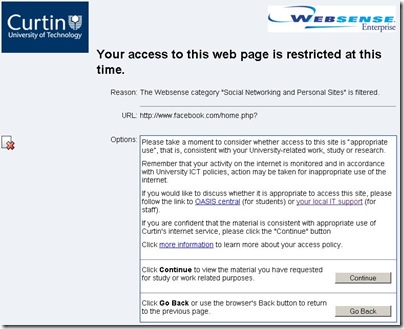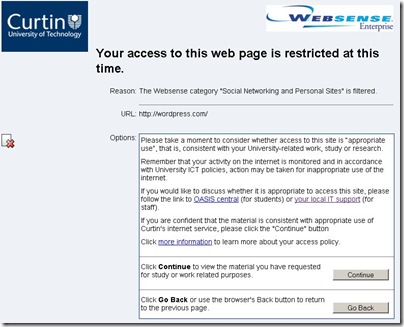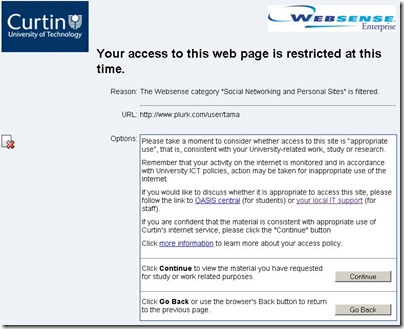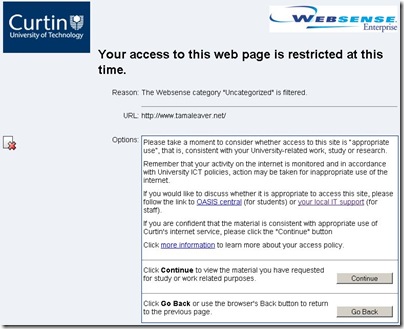Home » Posts tagged 'filtering'
Tag Archives: filtering
Digital Culture Links: March 2nd
Links for February 23rd through March 2nd:
- Angry Birds’ Mighty Eagle: ‘We have expanded the market for games’ [Technology | guardian.co.uk] – They may be familiar, but the stats around Angry Birds remain startling, starting with the franchise’s 700m downloads across all platforms – a figure likely to top 1bn sometime in 2012. The original iPhone game is the biggest-selling paid app ever on both the UK and US App Stores according to Apple, with follow-ups Angry Birds Seasons and Angry Birds Rio also in the top 10 in both countries.More than 1m people have reviewed the Android version of Angry Birds on Google’s Android Market, and Rovio has sold 25m plush toys so far. On the back of that, there are now more than 20,000 licensed Angry Birds products on sale […] Next up is Angry Birds Space, with a 22 March launch that will include a game, animated content, physical products and books. Rovio is working with NASA on the project, and National Geographic on the book, with more products to come. “It’s the first time we have everything available on launch day: animation, toys, books, candy, everything,” says Vesterbacka.”
- Zynga Seeks to Broaden Reach With New Gaming Platform [NYTimes.com] – “Zynga, the creator of FarmVille, Words With Friends, Mafia Wars and other popular social games, is going to start supplying friends for those who are lacking. The company announced a new gaming platform on Thursday that will match up players who do not know one another but who have a mutual interest in getting the crops in and spelling words with J, Q and X. The goal is to make social gaming, which was pretty easy to begin with, even easier for everyone. The platform will be introduced in a trial version on Zynga.com later this month. The move is likely to reduce Zynga’s reliance on Facebook, something analysts have said the company needs to do. Most Zynga games are played on that social network, which derives 12 percent of its revenue from Zynga. In the future, hard-core players will most likely go to Zynga’s own site, finding not only Zynga games but also offerings from independent developers.”
- The dirty job of keeping Facebook clean [Culture Digitally] – Fascinating post looking at Facebook’s leaked content moderation manual “Abuse Standards 6.1: Operation Manual for Live Content Moderators” which reveals a great deal about how Facebook decides what to delete and what to effectively sanction. As Gillespie says:”Facebook or otherwise, it’s hard not to be struck by the depravity of some of the stuff that content moderators are reviewing. It’s a bit disingenuous of me to start with camel toes and man-man foreplay, when what most of this document deals with is so, so much more reprehensible: child pornography, rape, bestiality, graphic obscenities, animal torture, racial and ethnic hatred, self-mutilation, suicide. There is something deeply unsettling about this document in the way it must, with all the delicacy of a badly written training manual, explain and sometimes show the kinds of things that fall into these categories.”
- BBC iPlayer Booms in Australia [The Next Web] – “Two months after BBC Worldwide launched its global iPlayer app to 11 Western European countries in July, the app arrived in Australia, followed swiftly by Canada and then Scandinavia. The global BBC iPlayer app is a Video-on-Demand (VoD) pilot (paid) subscription service that differs from the UK version of iPlayer, in that it gives international users access to an extensive archive of classic and contemporary British TV programmes. Whilst it was initially restricted to iPads, it was finally rolled out to the iPhone and iPod Touch too. Australia is now the biggest market for global iPlayer, and is giving BBC Worldwide, the commercial arm of the BBC, significant consumer insight as the company begins to look beyond the current pilot phase. Access to BBC iPlayer content in Australia costs AU$9.49 a month, or AU$89.99 a year, and an equivalent figure in Euros and Canadian dollars.”
- Capture full page – Screenshot Full web page – Capture full web page – Useful tool, lets you take a screenshot of an entire webpage by simply entering the URL.
- Author raises $1m to self-publish Order of the Stick webcomic book [Books | guardian.co.uk] – “The author of a self-published webcomic about a band of heroes in a fantasy role-playing world has raised more than $1m (£600,000) from fans on “crowdfunding” website Kickstarter to bring his stories back into print, making The Order of the Stick the richest creative work in the crowdfunding site’s history. Author and illustrator Rich Burlew launched The Order of the Stick online in 2003. Following the comic fantasy adventures of a collection of stick figures in a role-playing game world as they struggle with enemies and the rules of the game, much of the story is available online for free, but Burlew also began self-publishing parts of it in paper format in 2005. When the costs of keeping it in print proved too high, Burlew turned to Kickstarter following repeated demands from readers, launching a project in January to raise the $57,750 he needed to rerelease the books in print. Yesterday, he closed his fundraising project with 14,952 backers and $1,254,120 raised …”
Digital Culture Links: January 30th
Links for January 25th through January 30th:
- Twitter Is a Critical Tool in Republican Campaigns [NYTimes.com] – “When Newt Gingrich said in a recent debate that he was a man of “grandiose” ideas, Mitt Romney’s campaign pounced. It sent mocking Twitter messages with a hashtag, “#grandiosenewt”, encouraging voters to add their own examples of occasions when they felt Mr. Gingrich had been “grandiose.” Within minutes, the hashtag was trending on Twitter. Reporters picked up on it, sending out their own Twitter posts and writing their own articles. The result: for at least one news cycle, the Romney campaign had stamped a virtual “grandiose” on Mr. Gingrich’s forehead. If the 2008 presidential race embraced a 24/7 news cycle, four years later politicos are finding themselves in the middle of an election most starkly defined by Twitter, complete with 24-second news cycles and pithy bursts. With 100 million active users, more than 10 times as many as in the 2008 election, Twitter has emerged as a critical tool for political campaigns, allowing them to reach voters, gather data and respond …”
- Google CEO Larry Page: Identity Is A ‘Deep, Deep Part Of What We’re Doing’ [Huffington Post] – “Watch out: Google is getting personal. CEO Larry Page emphasized that Google is determined to deliver online experiences tailored to each individual’s interests and social circles, an ambitious goal that requires the web giant to learn even more about its users’ preferences and personal information. “Engaging with users, really deeply understanding who they are, and delivering things that make sense for them is really, really important. We’re at the early stages of that and Google+ is a big effort,” said Page during an earnings call Thursday. “This notion of identity is a deep, deep part of what we’re doing and an example of how we can make all our products better by understanding people.” Though Google already knows a great deal about the people who use its services, from what YouTube videos they’ve watched to whom they email most on Gmail, the web giant still lusts after the treasure trove of personal data Facebook has accumulated over the past eight years …”
- Twitter uncloaks a year’s worth of DMCA takedown notices, 4,410 in all [Ars Technica] – “On almost any given day, Twitter receives a handful of requests to delete tweets that link to pirated versions of copyrighted content—and quickly complies by erasing the offending tweets from its site. That fact itself is probably unsurprising to people familiar with the Digital Millennium Copyright Act (DMCA) takedown process, which gives sites like Twitter a “safe harbor” against lawsuits related to user behavior and uploads—so long as the sites don’t knowingly tolerate pirated material or links to such material. But Twitter has taken the unusual step of making DMCA takedown notices public, in partnership with Chilling Effects, a project of the Electronic Frontier Foundation and several universities. […] Scrolling through recent takedown notices, you’ll see names like Magnolia Pictures, Simon and Schuster, Warner Music Group, Universal Music Group, among those of many other media companies.”
- Apple’s iPad and the Human Costs for Workers in China [NYTimes.com] – Long and important piece which looks at the poor working conditions in some of the factories which assemble and supply the parts for Apple’s most popular products. It balances the enormous profits Apple makes with the human cost which have, in some cases, led to worker suicide.
- MPAA Wins the Oscar Screener Battle, but Loses the War [Epicenter | Wired.com] – “Every year, the MPAA tries desperately to stop Oscar screeners — the review copies sent to Academy voters — from leaking online. And every year, teenage boys battling for street cred always seem to defeat whatever obstacles Hollywood throws at them. For the last 10 years, I’ve tracked the online distribution of Oscar-nominated films, going back to 2003. Using a number of sources (see below for methodology), I’ve compiled a massive spreadsheet, now updated to include 310 films. This year, for the first time, I’m calling it: The MPAA is winning the battle to stop screener leaks. A record 37 films were nominated this year, and the studios sent out screeners for all but four of them. But, so far, only eight of those 33 screeners have leaked online, a record low that continues the downward trend from last year. They may be winning the battle, but they’ve lost the war. While screeners declined in popularity, 34 of the nominated films (92 percent) were leaked online by nomination day …”
- Tweets still must flow [Twitter Blog] – Twitter starts blocking tweets nationally: “As we continue to grow internationally, we will enter countries that have different ideas about the contours of freedom of expression. Some differ so much from our ideas that we will not be able to exist there. Others are similar but, for historical or cultural reasons, restrict certain types of content, such as France or Germany, which ban pro-Nazi content. Until now, the only way we could take account of those countries’ limits was to remove content globally. Starting today, we give ourselves the ability to reactively withhold content from users in a specific country — while keeping it available in the rest of the world. We have also built in a way to communicate transparently to users when content is withheld, and why. We haven’t yet used this ability, but if and when we are required to withhold a Tweet in a specific country, we will attempt to let the user know, and we will clearly mark when the content has been withheld.”
- No More Résumés, Say Some Firms [WSJ.com] – “Union Square Ventures recently posted an opening for an investment analyst. Instead of asking for résumés, the New York venture-capital firm—which has invested in Twitter, Foursquare, Zynga and other technology companies—asked applicants to send links representing their “Web presence,” such as a Twitter account or Tumblr blog. Applicants also had to submit short videos demonstrating their interest in the position. Union Square says its process nets better-quality candidates —especially for a venture-capital operation that invests heavily in the Internet and social-media—and the firm plans to use it going forward to fill analyst positions and other jobs. Companies are increasingly relying on social networks such as LinkedIn, video profiles and online quizzes to gauge candidates’ suitability for a job. While most still request a résumé as part of the application package, some are bypassing the staid requirement altogether.”
- Online echo chambers: A study of 250 million Facebook users reveals the Web isn’t as polarized as we thought. – Slate Magazine – A large-scale controlled study of Facebook users and their sharing habits suggests that far from an echo chamber (our social networks reinforcing the views and interests of our strong ties), Facebook users appear to get as much information from their weak ties (ie not as good friends/acquaintances) and thus suggesting social networks introduce diversity of information and perspectives. [Read Eytan Bakshy’s Rethinking Information Diversity in Networks]
Digital Culture Links: November 24th 2010
Links for November 19th 2010 through November 24th 2010:
- Long Live the Web: A Call for Continued Open Standards and Neutrality [Scientific American] – Inventor of the World Wide Web, Tim Berners-Lee, in a passionate defense of the open web (and a few pointed jabs at Facebook): “The Web is now more critical to free speech than any other medium. It brings principles established in the U.S. Constitution, the British Magna Carta and other important documents into the network age: freedom from being snooped on, filtered, censored and disconnected. […] If we want to track what government is doing, see what companies are doing, understand the true state of the planet, find a cure for Alzheimer’s disease, not to mention easily share our photos with our friends, we the public, the scientific community and the press must make sure the Web’s principles remain intact—not just to preserve what we have gained but to benefit from the great advances that are still to come.”
- Everything is a Remix – Part 1 [Vimeo] – Kirby Ferguson’s great video about remix, focusing on musical culture and the long history of remix as a core creative process (long before the web).
- The Attention-Span Myth [NYTimes.com] – A great read: “Whether the Web is making us smarter or dumber, isn’t there something just unconvincing about the idea that an occult “span” in the brain makes certain cultural objects more compelling than others? So a kid loves the drums but can hardly get through a chapter of “The Sun Also Rises”; and another aces algebra tests but can’t even understand how Call of Duty is played. The actions of these children may dismay or please adults, but anyone who has ever been bored by one practice and absorbed by another can explain the kids’ choices more persuasively than does the dominant model, which ignores the content of activities in favor of a wonky span thought vaguely to be in the brain. So how did we find ourselves with this unhappy attention-span conceit, and with the companion idea that a big attention span is humankind’s best moral and aesthetic asset? […] Instead, the problem with the attention-span discourse is that it’s founded on the phantom idea of an attention span.”
- New Facebook Messaging Continues to Block Some Links [Epicenter | Wired.com] – Facebook’s “not email” email system will block certain links. Definitely not email. “Facebook’s “modern messaging system” may make it convenient to seamlessly move between instant messaging and a Facebook.com e-mail account, but not if you are sharing a link to a file sharing site. Facebook began blocking BitTorrent link-sharing on Facebook walls and news feeds last spring, and also started blocking private messages between users that included a link to torrents on the Pirate Bay. Facebook says that content censorship policy isn’t changing, even as its new Facebook Messages service gives users e-mail accounts and encourages them to communicate even more through Facebook. “We have systems in place to prevent abuse on Facebook and prevent spam which we’ll continue to deploy with the new Messages,” a Facebook spokeswoman said in a written statement. “We don’t share specifics on those systems.””
- Facebook credits go on sale in UK [guardian.co.uk] – This is Facebook’s answer to the app store; watch the money flow! “Online currency, with which Facebook users can purchase pixel-based virtual farm animals or pay to attend virtual events, might seem small beer. But now the online goods economy may be about to boom in the UK, as Tesco and the games retailer Game start selling Facebook credits in more than 1,000 high street stores. The UK’s 33 million Facebook users will be able to buy so-called “Facebook credits” in the non-pixellated world. The gift cards, costing £10 or £20, will only be redeemable on Facebook, where users can spend the converted currency on any number of nonexistent objects. The virtual goods economy, where money is spent on items that only exist on the internet, is expected to exceed £550m for social gaming such as Zynga’s Farmville by the end of this year, according to a recent Inside Virtual Goods report.”
Digital Culture Links: April 16th 2010
Links for April 13th 2010 through April 16th 2010:
- No Free Lunch for Ning Users; Still Plenty of Bargains Elsewhere [Read Write Web] – “The social networking platform Ning announced today that it was making some substantial changes to the company. The news, coming just one month after Jason Rosenthal replaced Gina Bianchini as CEO, was sour for both employees and for many users of the service. Ning will cut 70 jobs and will end free subscriptions to the site. Rosenthal writes in the press release, “We will phase out our free service. Existing free networks will have the opportunity to either convert to paying for premium services, or transition off of Ning.” According to the release, paying subscribers account for 75% of the service’s traffic. These fees have ranged from $4.95 per month to use your own domain name, to $24.95 per month to remove Ning’s promotional links, although it’s unclear if those fees will change. But the service has long been used by many small groups and organization, many of which are in a tail-spin over today’s announcement.”
- Youth, Privacy and Reputation (Literature Review) – April 12, 2010 Authored by Alice E. Marwick, Diego Murgia Diaz, John Palfrey, Youth and Media Policy Working Group Initiative [Berkman Center] – Fantastically useful overview of youth & privacy writing & research: “The scope of this literature review is to map out what is currently understood about the intersections of youth, reputation, and privacy online, focusing on youth attitudes and practices. We summarize both key empirical studies from quantitative and qualitative perspectives and the legal issues involved in regulating privacy and reputation. This project includes studies of children, teenagers, and younger college students. For the purposes of this document, we use “teenagers” or “adolescents” to refer to young people ages 13-19; children are considered to be 0-12 years old. However, due to a lack of large-scale empirical research on this topic, and the prevalence of empirical studies on college students, we selectively included studies that discussed age or included age as a variable. Due to language issues, the majority of this literature covers the United States, the United Kingdom, the European Union, and Canada.”
- Murdoch hails iPad as saviour of news [The Age] – “Rupert Murdoch has launched a spirited defence of putting up paywalls around his newspaper websites, while embracing the game-changing potential of Apple’s iPad. The News Corporation chairman hailed the device as a possible saviour of the newspaper industry.Advocates of free newspaper websites often accuse Murdoch of being a technophobe but the Australian media mogul was happy to embrace the technology of Apple’s iPad tablet device, launched in the US on April 3. […] During an interview with journalist Marvin Kalb, Murdoch sat with an iPad and even picked it up to demonstrate how to navigate The Wall Street Journal’s website. He said the iPad could be the saviour of newspaper journalism – in electronic form, not print. ”I got a glimpse of the future … with the Apple iPad,” Murdoch said. ”It is a wonderful thing. If you have [fewer] newspapers and more of these … it may well be the saving of the newspaper industry.””
- Internet Filter Not Needed, Says US Ambassador to Australia [The Age] – US to Australia: don’t screw up the internet! “The US ambassador to Australia Jeff Bleich has criticised the Rudd government’s plan to filter the internet, saying the same goals can be achieved without censorship. The federal government’s $128.8 million Cyber Safety policy includes forcing ISPs to block access to certain websites and blacklist offensive material. Legislation to enable the scheme is set to be introduced this year. On ABC’s Q&A program last night, Mr Bleich said the “internet has to be free” and that there were other means of combating nasty content such as child pornography. “We have been able to accomplish the goals that Australia has described, which is to capture and prosecute child pornographers … without having to use internet filters,” he said. “We have other means and we are willing to share our efforts with them … it’s an ongoing conversation.””
Digital Culture Links: January 27th 2010
Links for January 27th 2010:
- Terms of (Ab)Use: US and UK Consumers Dance to Different iTunes [Electronic Frontier Foundation] – Further illustration of the insanity of different national licensing agreements: “For example, as with many TOS agreements, the iTunes U.S. Terms purport to allow Apple to terminate any part of the service, including access to any music or other content available through iTunes, at any time without warning. The U.K. Terms step back from that extreme position. In particular, the U.K. Terms do not allow Apple to affect a user’s access to content already purchased. Furthermore, before terminating a user’s access to iTunes, the U.K. Terms require there at least be “strong grounds,” rather than mere “suspicion,” to believe the user has violated the agreement, and also obligates iTunes to provide notice of any planned modification, suspension, or termination to the extent possible. In other words, the U.K. Terms provide customers at least some guidance as to the grounds for termination, rather than leave them to worry their access to iTunes can be terminated at any moment for any reason.”
- Australia Set to Introduce Internet Filter that Could Block Access to Thousands of Anime, Comics, Gaming (ACG) and Slash Fan Sites by Mark McLelland, University of Wollongong [Guest Post: Confessions of an Aca-Fan] – Guest post by Mark McLelland looking at the implications of the Australian government’s forthcoming ISP-level internet filtering legislation on slash, anime, manga sites and thus fans in Australia. Outlook: poor.
- After Three Months, Only 35 Subscriptions for Newsday’s Web Site [The New York Observer] – So, how’s that paywall going? “In late October, Newsday, the Long Island daily that the Dolans bought for $650 million, put its web site, newsday.com, behind a pay wall. The paper was one of the first non-business newspapers to take the plunge by putting up a pay wall, so in media circles it has been followed with interest. Could its fate be a sign of what others, including The New York Times, might expect? So, three months later, how many people have signed up to pay $5 a week, or $260 a year, to get unfettered access to newsday.com? The answer: 35 people. As in fewer than three dozen. As in a decent-sized elementary-school class. That astoundingly low figure was revealed in a newsroom-wide meeting last week by publisher Terry Jimenez when a reporter asked how many people had signed up for the site. Mr. Jimenez didn’t know the number off the top of his head, so he asked a deputy sitting near him. He replied 35.”
- Google Doodle For Australia Day Missing Aboriginal Flag [SMH] – “An Australia Day artwork by student Jessie Du will be viewed by millions on Google’s home page today but one feature of her original design is conspicuously absent – the Aboriginal flag. Jessie’s Australia-themed version of the Google logo beat thousands of other entrants in the search giant’s Doodle 4 Google competition […] Jessie, 11, is a student at Rydalmere East Public School. Her entry fashioned the letters in Google’s logo out of native Australian animals, such as the kangaroo, koala and emu. The central “o” in the original design was the Aboriginal flag but this has been edited out of the final version that adorns Google’s home page today. The discrepancy caused much consternation on Twitter, but a Google spokeswoman explained that the editing of Jessie’s design was due to a copyright dispute. The designer of the flag, Harold Thomas, who owns the copyright to the flag, refused to give Google permission to reproduce the design on its website…”
- Stop pining for life on Pandora and come back to planet Earth [Telegraph] – Conservative London Mayor Boris Johnson on Avatar: “It is a feature of powerful military empires that they like to romanticise their victims and luxuriate guiltily in the pathos of their suffering. Think of the Roman crowds pleading for the lives of captured barbarians in the amphitheatre.[…] And I can’t believe that many of these gloomy post-Avatar Westerners, when they really think about it, would want to up sticks to Pandora and take part in Na’vi society, with its obstinate illiteracy, undemocratic adherence to a monarchy based on male primogeniture and complete absence of restaurants. The final irony, of course, is that this entrancing vision of prelapsarian innocence is the product of the most ruthless and sophisticated money-machine the world has ever seen. With a budget of $237 million and with takings already at £1 billion, this exquisite capitalist guilt trip represents one of the great triumphs of capitalism.”
Curtin’s Internet Filtering and Blocking
How much does your educational institution filter the internet, especially if you’re at tertiary level (because K-12 filtering has other issues attached to it)? I ask because in my recent shift to Curtin, I’ve discovered the joys of university-level internet filter, something that didn’t happen at my previous institution. The list of blocked or click-thru site (ie not completely blocked, but having a warning message asking if you really need this website) seems to alter week to week. This morning, every time I want to visit Twitter, Plurk, Facebook or even a wordpress.com blog, I have to click through a warning page; every time I reload, I have to click through a warning page. Apart from being highly frustrating, I’m currently redesigning several units which are thematically linked by the concept of web presence; almost everything I want students to look at will have these warnings on the Curtin network. I wonder how many students will get frustrated and give up on the unit? This morning’s blocks so far …
Ironic Update: The first attempt to upload this blog post from my work computer led me to discover that even this website is blocked now:
I wonder what sort of hoops I’m going to have to jump through to try and fix this? 🙁
Update 2: Most of the blocking seems to have magically stopped as suddenly as it began about 12 hours ago so, being generous, I’d like to believe this was an accidental blocking … I’d really like to believe that …
